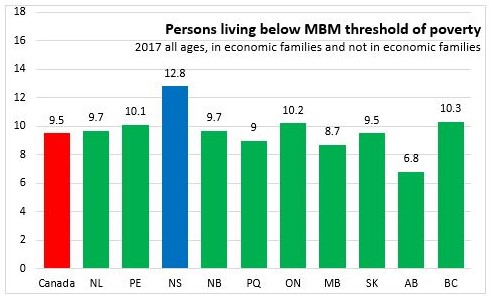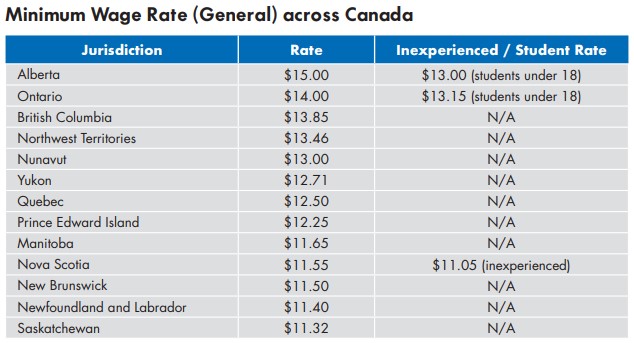Nova Scotia government bolsters minimum wage
The Minimum Wage Review Committee recommended an additional 55 cents each year until April, 2022.

caption
The extra dollar will give Nova Scotia the seventh highest minimum wage in the country.The provincial government announced Thursday that the minimum wage will increase by $1 to $12.55, making it the highest rate in Atlantic Canada.
The increase takes effect on April 1.
“All Nova Scotians should benefit from our province’s economic growth and steadily improving business environment,” Premier Stephen McNeil said in a media release on Thursday.
This increase is the largest announced in the province in a decade. Related stories
Hailie Tattrie said that while the increase will help, there’s still a long way to go. Tattrie volunteers for Fight for $15 and Fairness, a non-profit organization focused on increasing the minimum wage and negotiating stronger workers’ rights in the province.
“Do we think it’s going to help people? Absolutely,” said Tattrie. “But, at the end of 2021, the minimum wage will still only be at a little over $13. That’s still a couple of dollars away from 15 and that still doesn’t hold up to a living wage.”
The Canadian Centre for Policy Alternatives released a report in 2018 on living wages in the Maritimes. The report suggested an hourly wage of $19 was required in order for an average family to cover all necessities and enjoy a decent quality of life.
Tattrie said that an increase of $1.55 over the next two years is huge but won’t pull thousands of people out of poverty.
“We need to do better,” she said.
The 2017 Canadian Income Survey suggested 12.8 per cent of Nova Scotians live below the Market Basket Measure (MBM) threshold. The threshold estimates the share of the population that do not have the resources to afford a basket of basic goods and services.
Those below the MBM threshold are considered below the poverty line. Based on the data, Nova Scotia had the highest share percentage in Canada by 2.5 per cent.

caption
The results of the 2017 Canadian Income Survey place Nova Scotia 3.3 per cent above the national average.The cost of minimum wage
In 2011, Nova Scotia’s minimum wage rate was in line with Statistics Canada’s Low Income Cut Off (LICO).
The LICO line is calculated using the expenses of an average person or family on essentials like clothing, food and housing. If families need to spend 20 per cent more than the average Canadian family on these essentials, they fall below the LICO line and are considered low income.
Adjustments made to the minimum wage are calculated annually based on percentage changes in the annual national inflation rate (Consumer Price Index or CPI). The LICO line for the past nine years has been based on a full-time employee making minimum wage working 2000 hours per year (40-hour work weeks).
The Minimum Wage Review Committee released its annual report in December 2019. The report suggested that in fact the average work week for a full time employee with a job that pays minimum wage is 37 hours, rather than 40.
Based on this data, the committee found that an individual earning the current minimum wage working a 37-hour work week fell below the low income line.
The committee recommended an increase of 55 cents annually until April 2022, when the rate will be adjusted to account for inflation. The recommendations are designed to reach a base LICO line by April 2021 based on a full-time employee earning minimum wage working 37 hours per week.

caption
After April 2020, Nova Scotia will have the highest minimum wage in Atlantic Canada.More than money
Tattrie also said her organization is also focusing on the intersections of the minimum wage with other issues. One thing they’re considering is the scarce rental market in Halifax.
“Not only are we seriously lacking in places to rent, but it’s hard for people to afford the very few places that are there. People are stuck between a rock and a hard place,” said Tattrie.
While this is a small step in the right direction for her organization, she said the work is just beginning.
“We do want to celebrate this, this is a victory for both the campaign and for low-wage workers, but at the same time that doesn’t mean that the job is done,” she said. “Same goes for when we reach $15, we’re always growing and evolving, we always need to have an eye on what Nova Scotians need.”
About the author
Benjamin Elliott
Ben Elliott is a reporter for the Signal at King's College in Halifax. He got his HBA in Communication Studies from the University of Waterloo...
